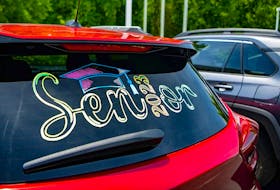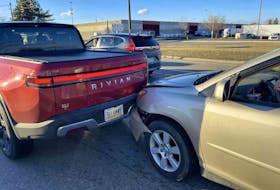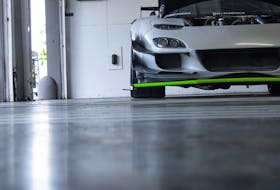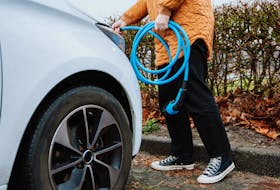LOS ANGELES — A relative unknown, Rivian, appears on track to beat the world’s major automakers to the punch with an all-electric pickup truck.
The U.S.-based automaker suddenly came out of stealth mode late last year at a grand reveal in Los Angeles.
There, the company unveiled two prototypes, the R1T electric pickup truck and the R1S SUV. Since then, Rivian has inked a $500 million deal with Ford, and taken a $700 million investment from Amazon.
The claimed specifications of both vehicles are impressive. Their unique all-wheel drive system is powered by four electric motors.
They’ll be able to wade through one metre of water, and accelerate from 0-100 km/h in around three seconds, quicker than most sports cars.
Depending on the battery size you choose, driving range is estimated between 370 to 660 km. Towing capacity for the pickup is rated at 5,000 kg.
The truck starts at US$69,000 while the SUV costs US$72,500. The first vehicles off the line will be more expensive versions with bigger batteries; Canadian customers should be able to take delivery by late 2020.
We spoke to company CEO and founder R.J. Scaringe back at the company’s coming-out party in L.A., and asked what consumers can expect from Rivian.

When did you start the company?
I started the company mid-2009, arguably the worst time in the world to start a car company. All jokes aside, this was the middle of GM and Chrysler bankruptcies, post Tesla, post Fisker.

What was the plan back then?
Originally, we were going to launch with a sports car, essentially a two-plus-two coupe. I raised a very small amount of money, a few million dollars, to develop that.
What happened?
We weren’t successfully able to answer this core question: why does the world need another car company? We shelved that coupe and took the capital we still had left to rapidly rethink the business.
What do you see as the biggest challenge in starting a car company, now, from scratch?
The challenge with this is designing a business that works in the world of today: a world dominated by car ownership, a world that's dominated by human operation. But that company still has to thrive in a world several decades from now: a world that will not be dominated by ownership, a world in which vehicles will have much higher levels of autonomy.
How close are the pickup and SUV shown in L.A. to the final product?
What you see here, this is not a concept that we might build, or that will sort of look like this. This is it.
Rivian is taking reservations online now but will there also be physical dealerships?
It will be company-owned retail in most locations. We will have partners in some locations that don’t allow us to sell direct — Texas being one of them.
Why has Rivian been so quiet, right up until the big coming out party in L.A.?
I took the decision, when I shelved the coupe, to go into true stealth. We didn't have signs on our building until last year.
The reason for that is, in some part, because of the mistakes I made when I first started, when I had 0.1 per cent of the capital and a rough, rough prototype and projecting overly aggressive timing and performance figures.
That’s not something I want to do again.

Pickups are the best-selling vehicles in North America. Why hasn’t anyone built an electric one yet?
Look at Ford, they're selling a hugely successful product, the F150. It’s so successful that it's hard for them to rationalize doing a completely different vehicle that will not sell 900,000 units a year. It’s a classic incumbent dilemma.
Where will Rivian vehicles be built?
The manufacturing plant is in Normal, Illinois. We purchased it about two years ago. We picked it up for steal: $16 million dollars, all cash. An absolute bargain.
The facility itself is very modern; it was running until the middle of 2016, building Mitsubishis, and we bought it with everything in it.
We’ve seen other electric automakers with bold visions and big promises come and go, Faraday Future, for example. Why should people trust Rivian can deliver?
We now have all the pieces lined up and that’s why we decided to come out. We’ve got a 600 person, incredible development organization with some of the best talent in the world.
We have hundreds of committed suppliers. We have proven technology that’s been tested for several years. We’ve had running prototypes for years.
How much money have you raised so far?
Into the business so far is just under half a billion. (Not including recent investments from Ford and Amazon.)
Why start the company at all? What was the idea behind it?
At the bigger level, the core reason why I started the company was this idea off disproving untruths. The world we live in is the result of people disproving things that were once thought impossible.
Tesla did this with their vehicle; they disproved this idea that electric cars are boring and slow. We believe we need to disprove the idea that electric can fit into adventure.
And to disprove that, it has to be demonstrably better than any vehicle ever designed in the history of our planet for going off-road or doing adventure.
This interview has been condensed and edited for clarity.

RELATED:









